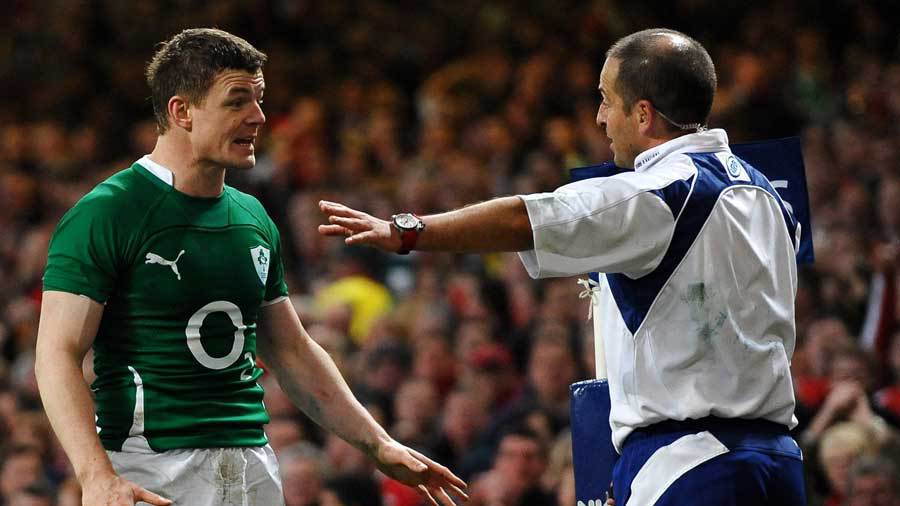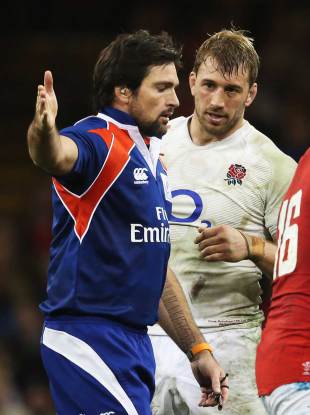|
Scrum Sevens
Is the referee always right?
Will Macpherson
February 18, 2015

Brian O'Driscoll remonstrates with Jonathan Kaplan © Getty Images
Enlarge
If it was easy, we'd all be one, right? Even with screens in the ground, a mate in his ear and two more running the lines, being a referee is a thankless task. You barely notice the best ones but only a madman would envy the men in the middle. Last weekend Glen Jackson came in for some flak following Scotland's agonising three-point loss to Wales. Some argued he was right, some to the contrary. Scrum Sevens takes a look at the incidents in which, rightly or wrongly, the referee made the headlines.
Rory? Sean? Rory? Sean?Few English football fans will ever forgive Andre Marriner for sending off Arsenal's Kieran Gibbs for a foul by his team-mate Alex Oxlade-Chamberlain, but seven years earlier rugby touch-judge Donal Courtney was involved in a similar case of mistaken identity. The Irish official advised George Clancy to send Scotland's Sean Lamont to the sin-bin for a late shoulder charge in a clash with France... which was actually committed by his brother, Rory. Such was the margin of France's victory and the abjectness of Scotland's performance that this incident wasn't even one of the losers' loudest moans after the game; it may have even worked in their advantage because Rory had only been on the field as a replacement for a matter of minutes. Unsurprisingly, Sean was a bit miffed: "I was stunned. I had a pretty sore head and how he thought I could go from the big tackle on the floor 10 metres away in a second I don't know. There was nothing I could do at the time - I'm the big brother, I'll take the rap." Lamont Jr, on the other hand, seemed rather pleased with the outcome. "I mean, I was wearing white boots, my brother has dyed white hair - people say we look alike, but that's a bit much," he said.
Balls-up2011 was one of the Six Nations' most congested years, with four teams winning three or more games. Wales were one such team, but for one of their triumphs - against Ireland - they were given a rather large helping hand by the officials. Picture the scene: penultimate round, four teams can still win the Championship. The Celts meet at the Millennium and after 49 minutes, Ireland lead 13-9. Jonathan Sexton over-hits a cross-kick, it goes out on the full and play is taken back 20 metres. Matthew Rees, very quickly, finds a ball and flings a quick lineout to Mike Phillips who sprints down the touchline from 40 metres out to score. Only trouble is the ball isn't the one Sexton booted out - as the law dictates it must be. Cue much confusion, head-scratching and grabbing of rulebooks. Jonathan Kaplan, despite the protestations of Brian O'Driscoll and Paul O'Connell, awarded the try after consultation with Peter Allan, who was running the line and was insistent the score was legitimate. It wasn't, of course, and Wales went on to win the match, while Martin Johnson's England took the Championship.
Breakdown in communication

Gareth Thomas tries to make his point to Chris White
© Getty Images
Enlarge
They say being a ref is all about communication. Communication with captains and front-rowers and with colleagues, whether up in the box or running the line. In 2007, under Gareth Jenkins, Wales hit a low ebb. With ten seconds to go in Rome, they were three points in arrears but had a very kickable penalty. Gareth Thomas, on as a sub and acting as skipper, turned to referee Chris White - seen by many as the best in the world at this stage - and asked him if they had time to kick for the corner. "There are 10 seconds, if you kick it into touch quickly - yes" came the reply. James Hook took the ball and very quickly, nudged it to the corner. But the whistle still went. Chaos followed, with the contrasting sight of Italy's jubilant players sprinting round the pitch celebrating and Thomas, face like thunder, remonstrating with Lewis. Indeed, the Welsh fumed all the way back to Cardiff but White, to his credit, issued an official apology for the confusion.
Knock-on blowThere have been few more frantic finishes to a Championship match than Wales v Ireland in 2003. The ultimate outcome - a one-point win for Ireland - saw the visitors welcome England to Dublin for a Grand Slam showdown, but the route there was decidedly fortuitous, with 10,000 Irish hearts in mouths at the Millennium after wing Justin Bishop intentionally knocked on. But they were able to breathe a collective sigh of relief as the English referee Steve Lander didn't award the Welsh a penalty, but instead blew for full-time, after six minutes of stoppage time. Quite how this decision came to be, no one knows. Lander had his arm out for an advantage, so Stephen Jones took what he thought was a free shot at a drop-goal, which was charged down by Denis Hickie. With Irish players turning for the posts, expecting the penalty, Lander blew the final whistle, and Bishop's indiscretion had proved Ireland's saviour.
England v Steve Walsh

Chris Robshaw talks with Steve Walsh
© Getty Images
Enlarge
This sounds something like a court case and, to be honest, such is the dislike on both sides, it wouldn't be surprising if Steve Walsh and England end up opposite one another before a judge at some stage. There has always been tension here. Walsh had a blazing row with England's conditioning coach Dave Reddin at the 2003 World Cup and had been involved in a controversial call in 2012 when David Strettle was denied a try in the final minute of England's Six Nations 2012 game against Wales. So when Walsh refereed their meeting in 2013 where Wales dished out an England thrashing and dominated them in the scrum, there was always going to be trouble. Infuriated by the outcome and how it was reached, Stuart Lancaster and Graham Rowntree wrote to the IRB seeking clarification and - rightly or wrongly - a decade-long feud lived on.
Whistle-happy Joubert creates a yawn-festReferees don't just make individual decisions, they set the tone for the entire game. Alongside the weather, they're the only force outside the two teams themselves capable of ruining or creating a spectacle. Scotland's meeting with Wales in the 2013 Championship is viewed by many as one of the more dire matches in Six Nations history. Admittedly neither side played the game terribly well or in a disciplined manner, but the way in which Craig Joubert refereed the game certainly did it no favours. There were 28 penalties, or one every 171 seconds, which resulted in a world-record 18 of them being kicked at goal. Greig Laidlaw slotted six for the Scots and Leigh Halfpenny seven for the visitors, who even had time for Richard Hibbard to cross for a try when the kickers weren't lining up shots at goal. Remarkably, it took Joubert 77 minutes to take out his cards, sin-binning Paul James, but he refereed with such vim that Scotland were continually pinged for engaging too early at the scrum.
Romain Poite's injury woeIn the first six of this list, the referees' mistakes made fans laugh, cry or simply tear their hair out. With the final entry, though, onlookers could only feel sympathy for Romain Poite as the French whistler endured a very different kind of refereeing nightmare - tearing his calf muscle during England's meeting with Scotland in 2011. We're all used to seeing players leaving the field with injuries of varying levels of severity - indeed it's a near impossibility in the modern game not to see the medics across an 80-minute period - but it's an altogether rarer occurrence to see the officials hobbling off. Poite's calf's demise was nobody's fault, but that was no consolation to Scotland coach Andy Robinson, who fumed as the injury had interrupted one of his side's more promising attacks in a game they lost 22-16. Robinson stalked the touchline as Poite was helped from the field by Scotland doctor James Robson and his trusty touch judge Jerome Garces miked up and prepared to replace him for the final 16 minutes. © ESPN Sports Media Ltd
|
Live Sports
Communication error please reload the page.
-
Football
-
Cricket
-
Rugby
-
- Days
- Hrs
- Mins
- Secs
F1 - Abu Dhabi GP
Abu Dhabi Grand Prix December 11-131. Max Verstappen ()
2. Valtteri Bottas (Mercedes)
3. Lewis Hamilton (Mercedes)
4. Alexander Albon ()
5. Lando Norris ()
6. Carlos Sainz Jr ()
-
ESPNOtherLive >>
Snooker - China Open
Tennis - Miami Open

